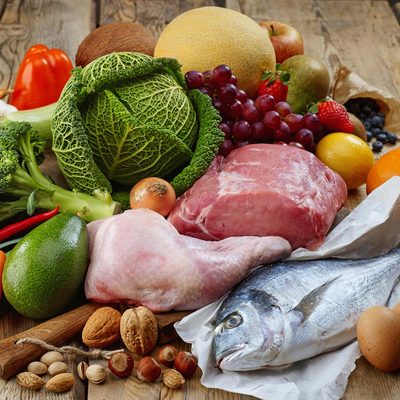If you’ve spent some time reading about nutrition and diets, there’s a good chance you’ve heard about the paleo diet. Paleo dieting has become incredibly popular and it’s something that many people are either adopting or considering adopting as a lifestyle choice
The question remains, is the paleo diet right for you? In what ways can it possibly help you?
Let’s take a look at some of the paleo diet benefits, and also consider some of the drawbacks.
What is The Paleo Diet?
The paleo diet focuses on having you eat like our ancestors ate back in the Paleolithic era, or more simply how cavemen ate. For this reason, it’s often also called the caveman diet.
This diet allows you to feast on foods like fruits, vegetables, healthy fats like nuts, seeds, oils, avocado, and butter along with all meats such as chicken, beef, fish, and other seafood.
The paleo diet however excludes all grains of any variety, dairy products, processed foods, legumes and refined sugar.
Paleo Diet Benefits
Now that you know a little about the paleo diet, what are the benefits?
First, it helps to combat hunger. Because the two primary nutrients you’ll be consuming on this diet are proteins and fats, your hunger levels will remain stable. Carbohydrates are what tend to cause a larger degree of hunger fluctuations, so by minimising carbs in your diet it'll help to keep your hunger in check.
Second, it will help you naturally lose weight. Since hunger is a big driver behind consuming more calories, and consuming more calories is what leads to weight gain, finding ways to naturally reduce your calories is a great thing and you’re setting yourself up for success.
The paleo diet is also a good diet if you are looking to combat heart disease as well. Much of the focus on this diet will be on healthy fats so if you make sure to avoid the offending fats, e.g. trans fats, you should see a decline in cholesterol and triglycerides.
The paleo diet is also great for those who are looking to fight disease. Given the fact that you’re encouraged to eat plenty of fresh fruits and vegetables, which are naturally very high in antioxidants, this diet is an ideal way of keeping your body strong.
Finally, because wheat is removed from the paleo diet, it's great for helping to reduce inflammation and most associated conditions. Many people find that inflammation increases the more they eat wheat-based food, so avoiding these foods is a wise move.
The Drawbacks of The Paleo Diet
Like most things in life, there are some drawbacks. While the paleo diet does have a lot to offer, it’s not without faults.
First, you may notice your energy level start to decline, especially if you perform intense exercise. Carbohydrates are the primary source of fuel for the body and the only source of fuel if you are lifting heavy weights or sprinting. Since this diet virtually eliminates all complex carbohydrates, you just aren’t getting the energy you need.
You’ll be hard-pressed to do an intense workout running off broccoli as a fuel source!
That said, there are ways around this drawback. Simply choose to add some healthy sources of carbohydrates to your diet plan, such as sweet potatoes, bananas, chestnuts and even potatoes. These options are used by many who follow the paleo diet who often find they’re lacking energy.
Alternatively, a few also choose to include some beans in their diet. However, to really maintain the integrity of the paleo diet you should avoid wheat-containing foods. No wheat or gluten is, in fact, one of the benefits of paleo, especially beneficial to those with wheat and gluten intolerance.
Another possible drawback is that the paleo diet may lead to weight gain if you aren’t careful. While most people will find their hunger dissipates on the diet and they start to naturally lose weight, others might not. Remember, the paleo diet means you’re eating high fat foods, so the calories can add up and you may gain weight.
The way around this? Calorie count. It’s the single best way to ensure that you are taking in the proper amount of energy to meet your weight loss goals.
Who is The Paleo Diet Suited For?
So who should adopt the paleo way of life? Who is it best suited for? Those who don’t mind cutting out grains will likely do well on this plan. If, however, you re someone who feels like you will go crazy if you don’t get a slice of bread every few days, paleo is not something you are likely to sustain.
This plan is also most suited to those who may be recreational exercisers, but who are not serious athletes training hard. Intense athletic training demands more carbohydrates so you’ll need an approach that provides that.
Finally, this plan is obviously not well suited to vegetarians because meat is such a critical part of the program. Since beans are not permitted and beans serve to be one of the main sources of protein in a vegetarian diet, individuals who want to follow the paleo approach would really struggle.
So there you have it, all the information you need to know if the paleo diet is right for you. It is a diet that can produce great results and it's relatively balanced and sustainable - it is these key characteristics that have many people choosing to adopt the paleo diet permanently.
...and remember, qualified nutritionists at Healthy Being are available to offer further general advice to help guide you in selecting the right products. So please, feel free to contact us at any time!
 Dr Peter Succar heads up the Product Research Team at Healthy Being and is an enthusiastic Health & Fitness Lifestyle Coach. He's passionate about helping others obtain optimum health, advocating realistic and achievable changes in diets and lifestyles that promote the body’s natural immunity, its ability to self-heal and achieve overall mental and physical well-being.
Dr Peter Succar heads up the Product Research Team at Healthy Being and is an enthusiastic Health & Fitness Lifestyle Coach. He's passionate about helping others obtain optimum health, advocating realistic and achievable changes in diets and lifestyles that promote the body’s natural immunity, its ability to self-heal and achieve overall mental and physical well-being.


 Certified Organic
Certified Organic Vegan Friendly
Vegan Friendly  Vegetarian
Vegetarian Organic Ingredients
Organic Ingredients Dairy Free
Dairy Free Gluten Free
Gluten Free Keto Friendly
Keto Friendly






























